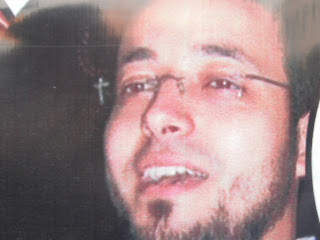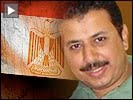The video is narrated by, and an interview in it conducted by, CBS's news reporter Lara Logan, an excellent CBS journalist who later was covering Egypt's revolution from Tahrir Square on the night Mubarak resigned and found herself surrounded by people who thought she was an Israeli spy and ended up brutally beating and sexually assaulting her. (Note: From what I've heard, the use of the language 'sexual assault' in this case does not mean rape.)
Here's a video from Al Jazeera that I found online about Egypt's dead. It was filmed before Mubarak resigned so begins with protests by mourners after the peaceful protests of Friday, January 28 turned violent.
Here are photos of some of young people who died in the revolution. I took these photos of banners that were in Tahrir Square.
This is the only woman I've heard about who was killed, but there may be others considering 385 people are estimated to have died.
Last Friday was a rally of more than a million people in Cairo's Tahrir Square. The rally was to celebrate the gains of the revolution, to remind the governing forces that there are still unmet demands (like lifting the Emergency Law and releasing hundreds of people were detained for their political views or participation in the protests), and to remember those who gave their lives in the revolution. Many of the Egyptians I saw there had this card hanging around their neck showing the photos of some of the people who died.
Unfortunately, I don't know anything about these young people and haven't been able to find their stories online, but work is being done to learn more about all those who died. I spoke to an attorney from the Egyptian Center for Economic and Social Rights who said that they are in the process of investigating this issue. He said one thing that has been coming to light is that most of the people who died were workers and were from poorer neighborhoods. This is not surprising considering that 40% of Egyptians who live on less than $2 per day.
Another person who died was an Egyptian Journalist, Ahmed Mohammed Mahmoud, age 36 , who was shot by a sniper when he was taking a photo of clashes with protesters in the street below from his Cairo balcony on Friday, January 28. Here's a link to an article about this:
http://www.tedjora.com/egyptian-journalist-killed-hit-sniper-bullet/
Here are two photos I found online of Ahmed Mohammed Mahmoud. This first one if from Democracy Now. Here's a link to their story about this and other events.
http://www.democracynow.org/2011/2/8/shooting_the_messenger_egyptian_journalist_shot
This second photo of the journalist with his wife:
I've thought more about what conflicting emotions many Egyptians must have: being thrilled about the revolution but also devastated by the loss of a family member or close friend. Also, there are still many families who have lost a family member but don't know yet whether the person is detained somewhere or dead. It must be very hard to be surrounded by such happiness and jubilation while also feeling so much pain.
News Update for February 22:
- The New York Times reported that three police officers were arrested in Alexandria, Egypt’s second largest city, and accused of firing live rounds of ammunition at protesters during the violence of January 28. Here’s the link to that article: http://topics.nytimes.com/top/news/international/countriesandterritories/egypt/index.html
- Egypt has said it would like the European Union to forgive its debt, though no formal request has been made.
- Britain’s David Cameron came to Cairo to meet with Egypt’s Prime Minister, Ahmed Shafik. Cameron told the press that one of the things on his agenda to discuss was the need to lift the Emergency Law that has been in effect for 30 years. Here’s a link to an article about this: http://213.158.162.45/~egyptian/index.php?action=news&id=15320&title=British%20PM%20holds%20talks%20in%20new%20Egypt.html
- I went to my first class of the semester at American University in Cairo. The class was moved from the downtown campus which is in Tahrir Square to the New Cairo campus about an hour away from downtown. About half our class is composed of students who remained in Egypt for the past month, including several Egyptians, so it was a very interesting discussion.
- Many people here are very concerned about what is happening in Libya where the government has had planes dropping bombs on neighborhoods that supported the anti-government protests and snipers shooting protesters and other unarmed civilians. Human Rights Watch reports at least 233 dead; other accounts estimate hundreds more. One man interviewed said one woman who went out on her balcony to look around was shot and killed. One report said the press is not being allowed into Libya and Internet has been shut off (as happened in Egypt for almost a week during the revolution) and many phones have been shut off. (Although I did hear late last night that one journalist from CNN had been able to enter the eastern part of Libya. He is an American journalist who lives in Egypt.)
Egypt borders Libya on the east and Tunisia borders it on the west. One critical difference between Egypt and Libya however is that the armed forces in Libya (many of whom it sounds like are mercenaries) are firing on civilians. Al Jazeera reported that two Libyan fighter jets landed in Malta with the pilots defecting after refusing to fire at protesters. CNN showed one video that was said to be the burned bodies of 6 soldiers who were unwilling to fire at protesters. I got an email from one classmate calling what’s happening in Libya a massacre and urging people to write to President Obama about the crisis. Here’s an article about what’s happening in Libya: http://www.nytimes.com/2011/02/22/world/africa/22libya.html?pagewanted=1&_r=1&partner=rss&emc=rss
















No comments:
Post a Comment